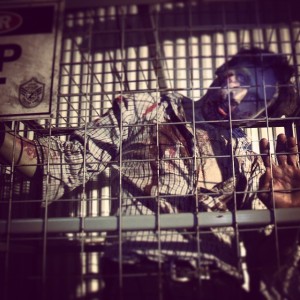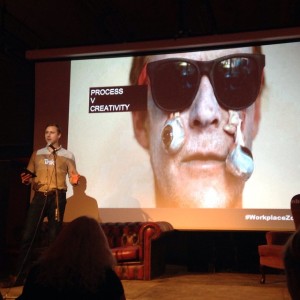
Earlier this month I attended a rather unusual conference at The Vaults in Waterloo. The subterranean venue, set directly beneath the original railway arches of Waterloo train station played host to the intriguingly named ‘Workplace Zombie Invasion’ event, hosted by productivity software company, AtTask.
The premise, expertly executed by actors in army fatigues and ‘mad scientist’ get-ups, was that we were in the midst of a zombie outbreak and we must work together quickly and efficiently to solve a series of tasks in order to survive. Split into teams, the attendees were rapidly herded through a maze of tunnels and side rooms with ominous names like ‘the long wet one’, ‘the gas bottle room’ and ‘the oubliette’. Our group leader hurried us on to our first task; mixing vaccines for the survivors while a zombie specimen thrashed in a cage beside us.
Over the next hour or so, we were solving riddles with zombies chasing us through shadowy assault courses, navigating our way over pits of toxic mist, finding maps, shooting targets with lasers and generally trying to escape from the reach of the clambering undead.
Eventually, we were ushered into the 'safe zone' by our (fake plastic) gun-toting guides. Here, our 'vaccines' (which tasted rather pleasantly like elderflower) were administered in test tubes and the ‘real’ conference started.

Stand out presentations were delivered by Adam Graham, Chair of BIMA and managing consultant at Cact.Us and Lawrence Weber, managing partner of Karmarama, both of whom focused on the eternal struggle between process and creativity.
Though it was generally agreed that processes (although great at increasing efficiency) can be a drag on creativity, Weber asserted that the only way to be truly innovative and think differently is by having a clear definition of the norm and a set of rules in place. In his words, “having a robust process for the ninety per cent means you can break it for the ten per cent”.
Many of the presenters had a clear and passionate hatred of email – AtTask conducted research that suggested the average employee receives 304 emails a week (though I think this is a pretty conservative figure for those of us working in communications)!
Graham drew on research by the University of California which found that knowledge workers switch tasks as often as every three minutes, due in large part to external interruptions but also to self interruptions. According to the research, we are so used to being interrupted by emails that we actually interrupt ourselves to check to see if we have been interrupted! And, according to the research, it can take up to 25 minutes to fully return focus to the original task.
So, distractions are bad, emails are distracting, and having processes in place is necessary in order to recognise the boundaries that can be pushed when it comes to creativity. There’s a fine balance though, too many processes slow us down and eat away at our brains... much like a zombie virus.
Head Office
Moore House
13 Black Lion Street
Brighton
United Kingdom
BN1 1ND
London Office
24/25 The Shard
32 London Bridge Street
London
United Kingdom
SE1 9SG
+44 (0) 1273 716 820
[email protected]
Head Office
Moore House
13 Black Lion Street
Brighton
United Kingdom
BN1 1ND
London Office
24/25 The Shard
32 London Bridge Street
London
United Kingdom
SE1 9SG
© 2005 - 2024 Man Bites Dog